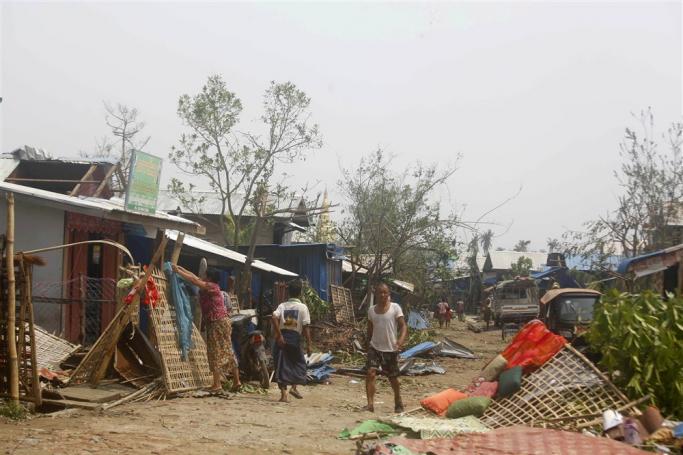Local NGOs are reportedly delivering humanitarian aid to victims of last week’s Cyclone Mocha, with a two-week plan for Rakhine and Chin seeking approval, says the United Nations OCHA in a press release 21 May.
The following are the main points of their latest report:
One week after Cyclone Mocha, a clearer picture is emerging of the depth of destruction as humanitarians work to expand assistance across affected areas. Sittwe and Rathedaung are the hardest hit areas in Rakhine. Shelter damage there is significant across all communities.
Destruction of public infrastructure, as well as disruptions to water systems, continue to limit access to clean drinking water in Rakhine, increasing the risk of waterborne diseases, especially among the affected population.
In Rathedaung Township, all rural health centers, hospitals and public schools have been destroyed according to partners.
Coastal villages along the Ah Ngu Maw-Maungdaw Road in Rathedaung and Maungdaw townships have suffered severe damage, including the loss of livestock.
Southern Maungdaw reportedly has also faced damage, including to schools in five villages.
Based on discussions in Nay Pyi Taw, humanitarians will soon be sharing a detailed, two-week distribution plan, for approval, outlining support that is ready to be provided to across all affected communities in Rakhine and Chin.
In the meantime, partners who already have access are prioritising the distribution of food and critical relief items where they can. Efforts are also underway to transport additional supplies to address stockpile shortages, pending necessary approvals for movement within and outside the country.
Humanitarian partners are disseminating messages in local languages to raise awareness around risks of waterborne disease and landmines among affected communities and promote safety precautions.
The cyclone has led to an increase in the number of unaccompanied children in Rakhine, highlighting the urgent need for child protection and appropriate support services.
Situation Overview
While a massive clean-up effort has been underway in Sittwe over the past week, continued field visits by humanitarian partners are shedding light on the magnitude of the crisis faced by people across the impact zone. Many people have been left without safe shelter and have lost all of their belongings, further exacerbating the already dire living conditions endured by many for the past three years due to the pandemic, ongoing conflict, and economic instability.
Humanitarian partners who have access to the population are already providing critical relief items to the extent possible, including through the distribution of food assistance. Efforts are underway to transport additional humanitarian supplies from Yangon to Sittwe to address stockpile shortages and bolster the response. Humanitarians are also exploring various approaches to facilitate the movement of supplies to impacted areas, both from within and outside the country, pending necessary approvals.
Telecommunications problems persist and access to banking services is being disrupted both by cyclone damage and bureaucratic obstacles. Humanitarian partners continue to disseminate safety messages in local languages focusing on the risk of waterborne disease and the movement of landmines in flooded areas. Venomous snakes are also an increasing threat in flood-affected areas, especially in Magway and Sagaing.












